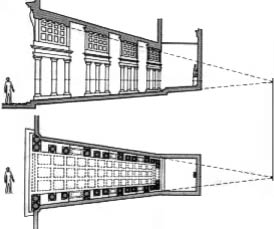Scala Regia
7:00 AM |
| Gianlorenzo Bernini, Scala Regia, 1666 |
By EMMA SHAPIRO
 Before Bernini redesigned the entrance from St. Peter's Basilica to the Vatican, popes thought of the trip between the buildings as long, difficult, and dark. Alexander and the Popes requested a new entrance for reasons of health and safety, but also so they could enter through a more impressive entryway. Maderno attempted to revamp the entrance before, but Bernini was the one to make a solution. He tore down a tower and realigned the Portone di Bronzo to make enough space for his vision. Even after maximizing his work space, Bernini still had only a constrained area. The hallway was narrow, the lines of the walls were not parallel which created a triangle shape, and the stairway had to begin and end at specific heights.
Before Bernini redesigned the entrance from St. Peter's Basilica to the Vatican, popes thought of the trip between the buildings as long, difficult, and dark. Alexander and the Popes requested a new entrance for reasons of health and safety, but also so they could enter through a more impressive entryway. Maderno attempted to revamp the entrance before, but Bernini was the one to make a solution. He tore down a tower and realigned the Portone di Bronzo to make enough space for his vision. Even after maximizing his work space, Bernini still had only a constrained area. The hallway was narrow, the lines of the walls were not parallel which created a triangle shape, and the stairway had to begin and end at specific heights.The width of the stairs narrowed with ascension, so Bernini installed columns to give an impression of uniformity of length. Where the hallway widened Bernini constructed the columns more towards the middle of the walkway; tricking visitors into believing the stairs were the same length the entire way up. Bernini also decreased the height of the columns as they moved up. Looking at the Scala Regia visitors thought the columns looked shorter, but figured it was only a trick of perspective. To fix the problem of length and darkness, Bernini adapted the stairwell even more. For the stair height, Bernini created a landing between flights to give a sense of space. He then added light to the stairwell to widen the space by opening one window over the landing, and another at the top of the stairs.

 Bernini referred to his Scala Regia as the most daring operation that he had attempted, and claimed that if he had heard of another artist doing the same, he would not have believed them. But as it turned out, Borromini had used the same approach his earlier, smaller scale, Palazzo Spada. In Borromini's Palazzo Spada, he uses deception to make an 8.82 meter walkway appear much longer. Just like Bernini shortened the columns with ascension through the walkway, so had Borromini. This example exemplifies the complex relationship between Bernini and Borromini. Even if Borromini had been bothered by Bernini's obvious borrowing of his ideas, he did not voice it. Borromini was used to Bernini getting effusive praise. The public easily forgot about Bernini's mistakes, and the help lent to him by Borromini, and consistently regarded Bernini as far more advanced.
Bernini referred to his Scala Regia as the most daring operation that he had attempted, and claimed that if he had heard of another artist doing the same, he would not have believed them. But as it turned out, Borromini had used the same approach his earlier, smaller scale, Palazzo Spada. In Borromini's Palazzo Spada, he uses deception to make an 8.82 meter walkway appear much longer. Just like Bernini shortened the columns with ascension through the walkway, so had Borromini. This example exemplifies the complex relationship between Bernini and Borromini. Even if Borromini had been bothered by Bernini's obvious borrowing of his ideas, he did not voice it. Borromini was used to Bernini getting effusive praise. The public easily forgot about Bernini's mistakes, and the help lent to him by Borromini, and consistently regarded Bernini as far more advanced.

0 comments